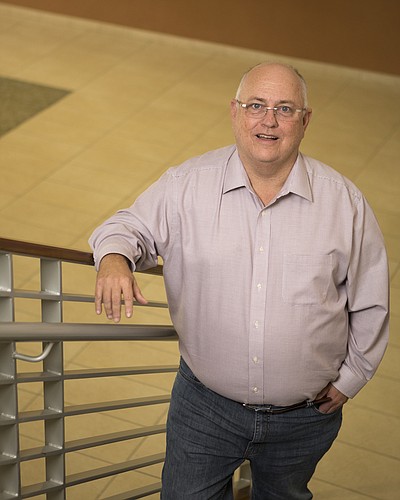- April 5, 2025
-
-
Loading

Loading

Eric Knellinger, founder and president of US Federal Contractor Registration, a St. Petersburg company that helps other businesses vie for government contracts, predicted 2020 would be a banner year for the 11-year-old firm — and he was right.
Knellinger has learned that when the economy slows down, like during the COVID-19 crisis, the private sector shrinks and the public sector grows. That means more federal contracts are up for grabs.
The surge is evident in USFCR’s revenue, which has grown by 20% this year, and its workforce, which has risen from 52 to nearly 60 employees. The company’s CFO, Ashby Green, expects to close the book on 2020 with $13 million in sales, and he won’t be satisfied merely with 20% growth in 2021.
“I don’t think we’ll be happy with 20% — I won’t be happy with 20%,” Green says. “Next year, 20% is going to the bare minimum, but we don’t want to grow so fast that we have a learning episode where the clients pay for it and we have to fix it. I’d rather keep [our growth] consistent … we want to make sure we grow slow and steady, but it’s time to speed up a little.”
'What we have found is that there are business owners who are now more receptive to trying things that they used to be uncomfortable with. That's been really good for us.' Ashby Green, US Federal Contractor Registration
Green, 46, has done fractional CFO work for several other companies, including St. Pete-based Kobie Marketing. In USFCR, he sees a long-term home for his talents. His leadership is also a valuable assist for Knellinger — who is battling kidney cancer but remains active with the firm. He travels to Boston once a month for treatment, Green says, but otherwise is a daily presence at the USFCR office. (Knellinger’s wife, Linda, died in 2011 after a four-year battle with brain cancer.)
“Every time he goes [to Boston], it’s a good report,” Green says. “He’s as active as I’ve ever known him to be.”
It was a much different story in late 2018 and early 2019, when Green first began to work with Knellinger as a consultant. Knellinger’s health, Green says, was not good at the time and he sought Green to help him explore options to sell his stake in USFCR to his partner.
But as Knellinger’s health improved, “we started flipping the script,” Green says. Today, he and Knellinger are in the process of buying out the other partner in the business. “We are very close now. Then we’ll take our plan into the future and continue to grow.”
Predictably, 2020 has seen a massive increase in federal spending on medical products, particularly the personal protective equipment (PPE) in such short supply during the initial phase of the pandemic. The government has also loosened restrictions on lending and instituted initiatives like the Paycheck Protection Program that, says Green, have given businesses some wiggle room to pursue contracts they might not have in previous years.
“What we have found is that there are business owners who are now more receptive to trying things that they used to be uncomfortable with,” Green says. “That's been really good for us. It doesn't mean you can guarantee a government contract to all of our clients, but we can guarantee to serve them to the best of our ability. So we've been really excited about the people we're talking with, being more receptive to what we do. Our engagement has gone up drastically through [the pandemic].”
Some challenges remain on the horizon for USFCR. The federal government makes available a plethora of data USFCR can use to help clients determine what contracts to pursue, for example, but Green worries that information could be restricted in the future. “We have to prepare now if that were to occur,” Green says.
Marketing and messaging is another hurdle to overcome. Search engine optimization and online ads are useful tools, but Green says USFCR isn’t a concept that can easily be “put on a billboard.” He envisions the company putting on seminars and exploring strategic partnership opportunities with MacDill Air Force Base in Tampa — one of the largest federal government entities in the region.
“I would rather, in a more genuine way, get in front of people,” Green says. “I can’t imagine that we wouldn’t do that.”